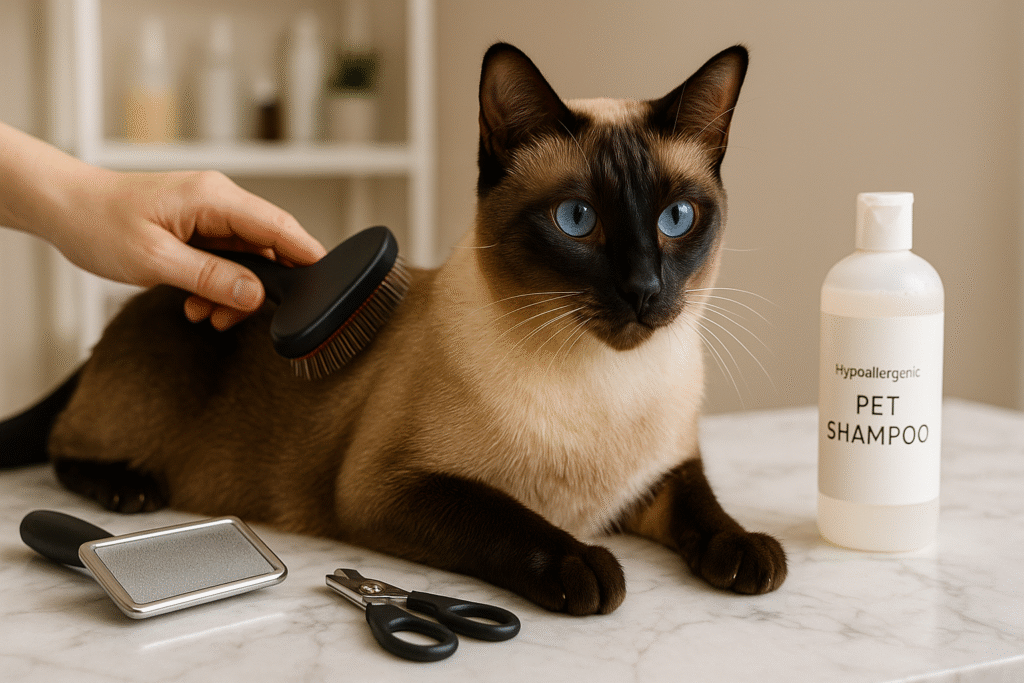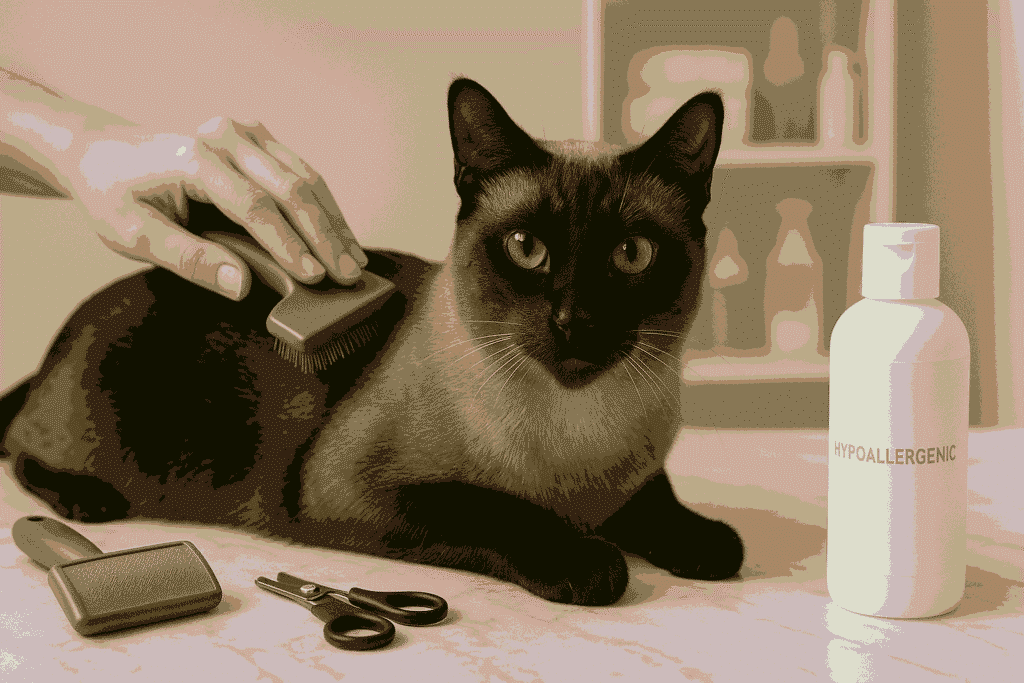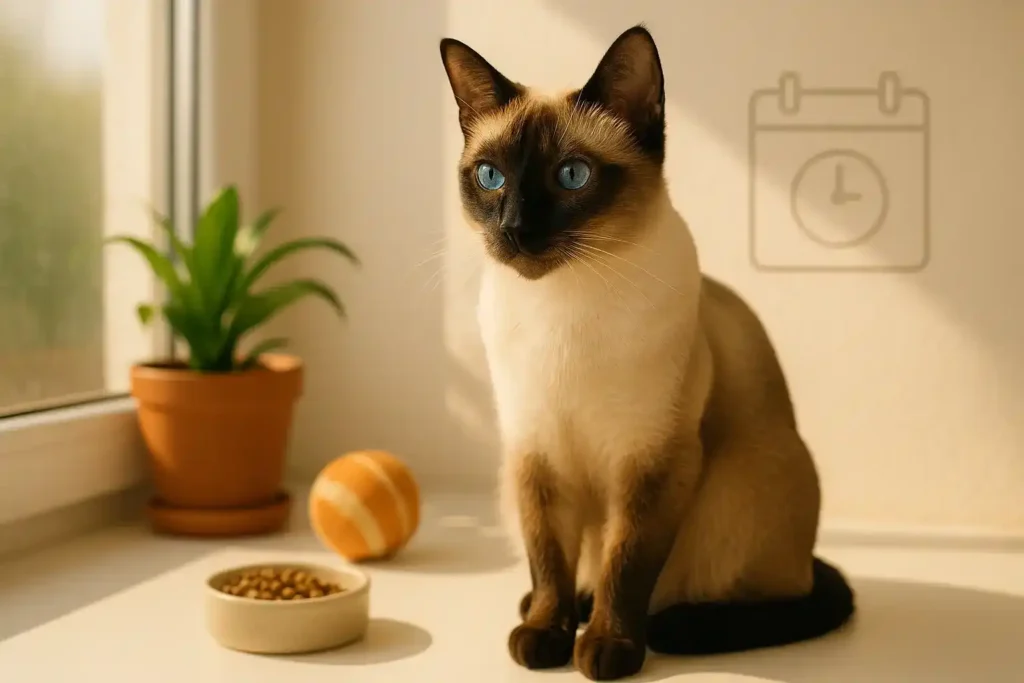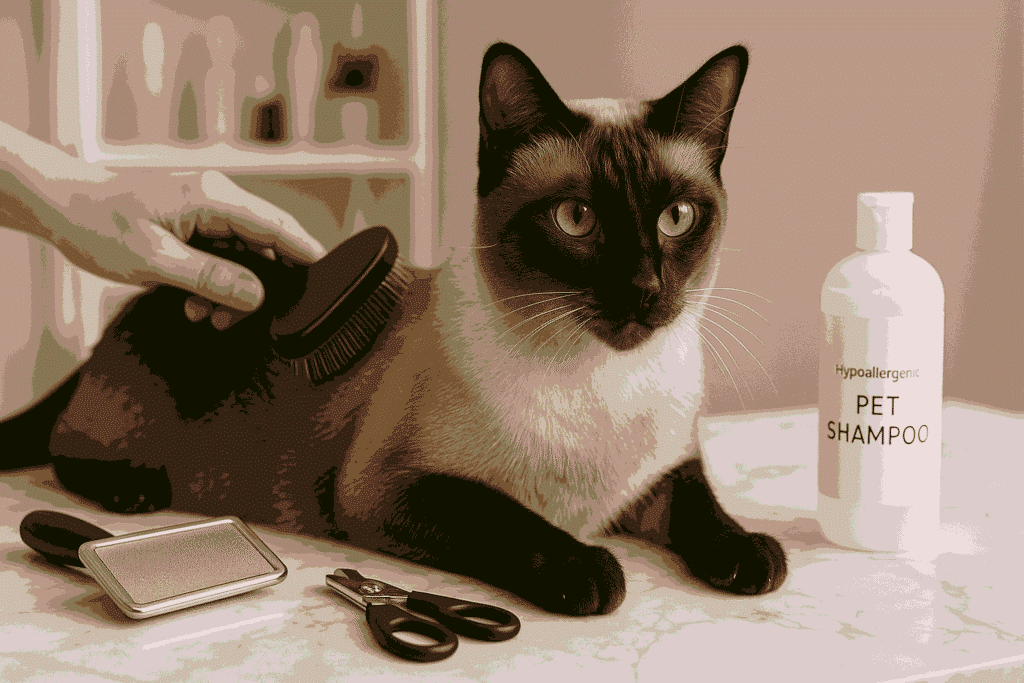Siamese cats are known for their beautiful looks and bold personalities. They are talkative, social, and love being around people. Unlike many other cats, Siamese cats often follow their owners and expect constant attention.
Their personality can vary based on gender, upbringing, and even coat color. Male Siamese cats are usually playful and needy, while females may be more independent. They are intelligent, emotional, and can become anxious if left alone for too long.
If you’re thinking about getting a Siamese cat or want to better understand yours, this guide has everything. From their behavior and communication style to common problems and compatibility with kids or pets—this article covers it all.
- What makes Siamese cats so unique and affectionate
- Differences between male and female Siamese personalities
- Whether coat color affects behavior (e.g., black, blue, white)
- How they bond with humans and other pets
- Their vocal nature and what they’re trying to say
- Playfulness, energy level, and trainability
- Common behavioral problems and how to fix them
- Health and lifespan linked to their personality
- Choosing the right Siamese cat for your lifestyle
The Definitive Guide to Siamese Cat Personality
Siamese cats are one of the most recognized and adored breeds in the feline world. Known for their striking blue eyes, sleek bodies, and captivating voices, they possess a personality that’s as bold as their appearance. Understanding their temperament is key to building a strong, fulfilling relationship with this unique breed.
These cats are anything but ordinary. They’re intelligent, curious, and crave social interaction. Siamese cat personality traits go far beyond mere looks they shape their behavior, communication style, and compatibility with families.
If you’re considering adopting a Siamese or simply want to understand your cat better, this guide covers everything from temperament to common problems and lifestyle compatibility. Let’s dive in!
What Defines the Personality of a Siamese Cat?
Siamese cats are famously vocal, affectionate, and attention-seeking. They form deep bonds with their humans and often follow them from room to room, showing intense loyalty and curiosity. Their behavior is intelligent and emotionally expressive, often described as “dog-like.”
These cats are interactive and don’t enjoy being left alone for long periods. They thrive on human interaction and are best suited to households where someone is frequently present. Their emotional traits make them sensitive to changes in their environment.
Owners often describe them as being dramatic, quirky, and sometimes demanding. They’re not shy about voicing their opinions or needs, which can be both endearing and challenging for some pet parents.
- Highly vocal and communicative
- Emotionally sensitive and deeply bonded with owners
- Intelligent and curious behavior
- Social and affectionate
- Often compared to dogs in their loyalty
Siamese cat personality is all about connection, communication, and curiosity—making them a delight for the right pet owner.
Male vs Female Siamese Cat Personality
The personality of a Siamese cat can differ based on gender, although each cat has its own quirks. Males are generally more playful, outgoing, and affectionate. They often crave attention and are known to be more extroverted.
Females, while still social, can be slightly more independent and cautious. They’re usually better at setting boundaries but still maintain the breed’s affectionate nature. Females may also form closer bonds with a specific individual in the household.
Choosing between a male or female Siamese often depends on your lifestyle and what kind of companion you’re seeking. Both genders are intelligent and interactive but exhibit their affection in slightly different ways.
- Males: playful, extroverted, attention-seeking
- Females: independent, selective in bonding
- Both are intelligent and social
- Personality may shift with age or environment
- Bonding varies by individual and gender
While both genders are loving and loyal, understanding these differences can help in choosing the perfect Siamese companion for your home.
Do Color Variants Affect Siamese Cat Personality?
Siamese cats come in various color points—seal, blue, chocolate, lilac, black, and white—and many wonder if color affects personality. While most behavioral traits are consistent across the breed, subtle differences are reported anecdotally.
For example, some owners claim blue and white Siamese cats tend to be calmer, while seal points and black Siamese cats show more spirited or assertive personalities. However, there’s no scientific evidence directly linking coat color to temperament.
What matters more is upbringing, genetics, and early socialization. Still, understanding common beliefs can help manage expectations when choosing a Siamese cat.
- Blue Siamese: often described as gentle and reserved
- Seal/Black Siamese: perceived as bold and assertive
- White Siamese: known for being balanced and affectionate
- Color doesn’t guarantee behavior but may influence perception
- Environment shapes behavior more than color
While personality differences may exist across color types, they are subtle and should not be the primary factor in choosing your Siamese cat.
Social Behavior and Human Bonding
Siamese cats are known for forming strong attachments with their owners. They thrive on attention and will often follow you around the house, wanting to be part of every activity. This attachment makes them ideal companions for people who want a close feline bond.
They are highly social, not just with humans but also with other pets. They enjoy interactive play and can get along well with children if introduced properly. However, they do not do well in isolation and may develop behavioral issues if neglected.
Their emotional intelligence enables them to sense their owner’s mood and respond accordingly. Many Siamese cats even develop routines with their humans, waiting by doors or meowing at regular times.
- Strong human attachment, often described as “velcro cats”
- Thrive in social, interactive environments
- Good with children and other pets if properly introduced
- May develop anxiety when left alone for too long
- Capable of emotional attunement with owners
Siamese cats are companions in every sense engaging, responsive and emotionally connected to their families.
Vocalization and Communication Style
Vocalization is a hallmark of the Siamese breed. They are among the most talkative cats, often engaging in long “conversations” with their owners. Their voice is distinct—raspy, loud, and expressive.
These cats use vocal cues to express everything from hunger to loneliness or boredom. They don’t just meow they trill, chirp, and howl, sometimes loudly. This behavior can be charming or overwhelming, depending on your tolerance.
Understanding what your Siamese is trying to communicate is key to a peaceful coexistence. They often expect their humans to respond and may escalate their meowing if ignored.
- Extremely vocal; communicate with unique sounds
- Use meows to express needs and emotions
- Known to have “conversations” with owners
- Demand attention through vocalization
- Can become louder if their needs aren’t met
If you enjoy talkative pets who make their feelings known, the Siamese cat’s voice will quickly become a beloved part of your daily life.
Activity Level, Intelligence, and Playfulness
Siamese cats are not couch potatoes. They are energetic, playful, and highly intelligent. You’ll often find them exploring cabinets, playing fetch, or solving puzzles.
They require mental stimulation to prevent boredom, which can lead to destructive behavior. Toys, climbing trees, and even puzzle feeders are excellent tools to keep them engaged. They excel in learning tricks and enjoy structured playtime.
This intelligence makes them trainable, similar to dogs. You can teach them commands, leash-walking, and even obstacle courses, making them a great match for active households.
- High energy and playfulness
- Require mental and physical stimulation
- Easily trainable with positive reinforcement
- Thrive on structured routines and games
- Boredom may lead to mischief or aggression
Siamese cats need an environment that keeps them mentally and physically engaged—they’re happiest when busy.
Common Behavioral Problems and Solutions
Despite their charm, Siamese cats can show behavioral issues if not properly managed. These include biting, excessive vocalization, or aggression—often triggered by boredom or lack of attention.
Some owners also report issues like separation anxiety or difficulty introducing them to other pets. Most of these problems are rooted in unmet social or mental needs.
Solutions include scheduled playtime, companionship (human or another pet), and environmental enrichment. Consistency and patience are crucial in managing these behaviors.
- Biting often stems from overstimulation
- Separation anxiety is common
- Aggression may result from lack of exercise
- Needs structured interaction and stimulation
- Early socialization helps reduce behavior issues
Understanding and addressing their emotional needs is the key to raising a happy, well-behaved Siamese cat.
Compatibility with Children and Other Pets
Siamese cats are generally good with children and other animals when introduced gradually. Their social nature helps them adapt, but their assertiveness means they may not tolerate rough handling.
With proper supervision and training, they can become loving companions to kids. They also tend to get along with dogs and other cats, especially when raised together.
Early exposure to a variety of people and environments helps build a well-adjusted cat. Monitoring initial interactions ensures a safe and stress-free integration.
- Friendly toward well-behaved children
- Can coexist peacefully with dogs and cats
- Require proper introductions and socialization
- Sensitive to aggressive or chaotic environments
- Thrive in structured, respectful households
Siamese cats are family-friendly when their need for respectful interaction and space is met.
Health, Lifespan, and Emotional Well-being
Siamese cats typically live 12–20 years with proper care. Indoor living, good nutrition, and regular vet visits contribute to a longer, healthier life. However, they’re prone to specific health issues.
Common conditions include asthma, dental disease, and amyloidosis—a liver disorder. Some behavioral issues may stem from discomfort or illness, so regular checkups are essential.
Mental health is just as important. Enrichment activities, companionship, and attention prevent stress-related problems and contribute to emotional stability.
- Lifespan ranges from 12–20 years
- Indoor cats tend to live longer
- Prone to respiratory and liver conditions
- Emotional needs influence behavior
- Regular care ensures longevity and happiness
Caring for a Siamese involves a holistic approach to both physical and emotional health.
Choosing the Right Siamese Cat for You
When selecting a Siamese cat, consider personality over appearance. Whether it’s a seal point male or a blue point female, each cat has a unique character shaped by upbringing.
Also think about your lifestyle—Siamese cats don’t like being left alone, so choose this breed only if you can provide time and interaction. Adoption from reputable breeders or rescues ensures you get a healthy, socialized cat.
Don’t fall into the trap of assuming one color or gender guarantees a certain temperament. Spend time with the cat before adoption to assess compatibility.
- Choose based on lifestyle match, not just looks
- Ensure time commitment for companionship
- Adopt from ethical sources
- Meet and observe before deciding
- Consider another pet for companionship if you’re often away
Finding the right Siamese cat means matching personalities—not just aesthetics.
Siamese Cat Personality by Gender
| Trait | Male Siamese | Female Siamese |
|---|---|---|
| Affection Level | Very High | High |
| Playfulness | Energetic | Moderately Energetic |
| Independence | Low | Moderate |
| Socialization | Extroverted | Selectively Social |
| Vocalization | Loud and Frequent | Moderate to Loud |
Common Behavioral Problems and Fixes
| Problem | Likely Cause | Recommended Solution |
| Biting | Overstimulation | Limit petting sessions |
| Excessive Meowing | Boredom, hunger | Scheduled play, consistent meals |
| Aggression with other pets | Lack of socialization | Gradual introductions |
| Destructive behavior | Lack of stimulation | Puzzle toys, playtime |
| Separation anxiety | Loneliness | Another pet, calming aids |
Final Thoughts
Siamese cats are charismatic, loving, and interactive pets, perfect for those who can give them the attention and stimulation they need. From their distinct voices to their loyal hearts, they make unforgettable companions.
Understanding their personality ensures you can meet their needs and form a deep, rewarding bond. If you’re ready for a vocal, affectionate, and intelligent feline friend—Siamese cats might just be your perfect match.



